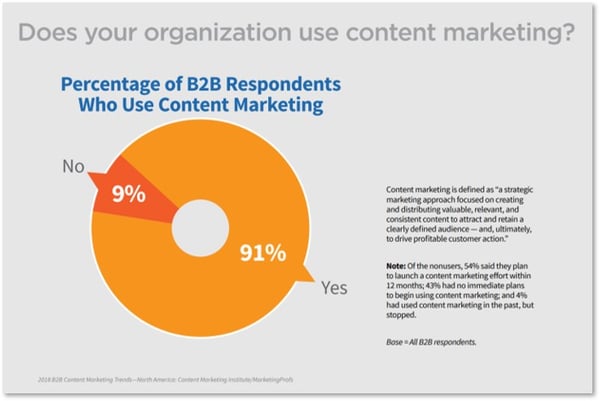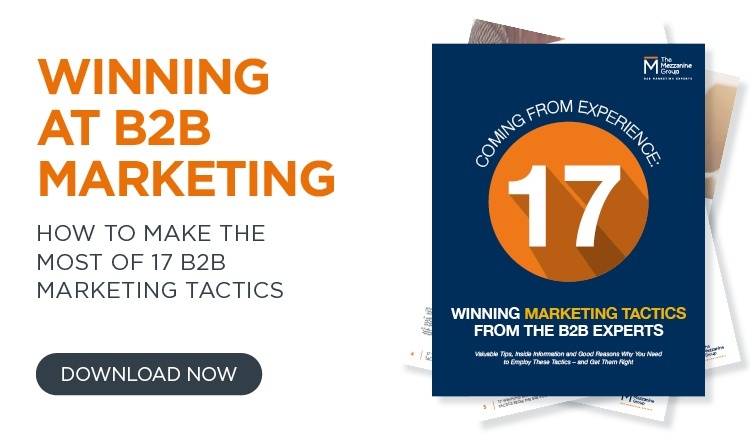What is Content Marketing and How Does it Grow B2B Companies?

According to The Content Marketing Institute, an overwhelming 91% of B2B marketers use content marketing. Based on this statistic, most people would conclude that there's almost no B2B company left that ISN'T doing content marketing. We respectfully disagree.

Based on our experience, the number of small and mid-sized companies who are using content marketing in a structured way is decidedly lower than 91%. In our most recent B2B Marketing Benchmark Study, less than 50% of small and mid-sized B2B companies were using content marketing.
There's compelling data for B2B companies to use content marketing. Those that do convert six times higher than those that don’t. That's one of the reasons that content marketing is growing in usage, and why it matters to all B2B companies, no matter their size.
This post is a 'Content Marketing 101' for B2B executives who are wondering if they should get more serious about content marketing, and how they should go about doing so.
Before we delve deeper into the details of content marketing, let’s first understand what content marketing is.
What is B2B Content Marketing?
Put simply, content marketing is the use of educational material (such as blogs, articles, videos, infographics, whitepapers and others) to reach your audience. The primary intent of content is to inform and educate. The secondary goal is to develop an affinity between your audience and your company, so that ultimately you attract new opportunities and secure new business.
Examples of Good B2B Content Marketing
Who’s good at content marketing in the B2B world?
Here are a few companies:

The inbound marketing software industry is flooded with an array of companies like Pardot, Marketo and so on. HubSpot, however, has managed to stand out with smart content marketing.
From its inception as a marketing software start-up in 2006 to being an empire worth several billion dollars today, Hubspot has been a true adherent to the philosophy of content marketing.
HubSpot has a prodigious blog that provides useful insights on inbound marketing, social media, SEO, content (of course) and other hot and current business and marketing topics. All of this content serves as Hubspot’s sales funnel and helps it reach small businesses on the go.

If you ever want to know how content marketing is done, look to Alex Rynne, the Associate Content Marketing Manager at LinkedIn.
LinkedIn is known for producing data-driven and highly visual content that sparks conversions. However, the brand is not ashamed of writing basic how-tos and tactical content revolving around the usage of LinkedIn.
From just 500k members to a community of half-a-billion members, LinkedIn played its marketing cards right, and content contributed significantly to its impressive growth.

WP Engine is a hosting platform focused on WordPress. WP Engine operates in a very crowded market – with many of its peers competing on a low-price model.
Instead of fighting to the bottom in a price war, WP Engine has made it big through their use of content marketing. Their target customers are WordPress users, so WP Engine started attracting them by providing useful content related to common problems that WordPress users face while also pitching their products and services in between.
The result – their strategy was able to drive significant sales, and this made way for some impressive figures – acquisition of 300,000 sites, applications in 128 countries and raising a cumulative of $40 million in five rounds of funding.
Advantages of Content Marketing for B2B Companies
So why all the fuss about content marketing? There are several reasons it's become the heart and soul of good B2B marketing.
-
It positions you as an expert
As you start generating quality content that helps your target customers understand an issue, you gain credibility and authority in the industry. Let’s understand this with the help of an example. Suppose you sell software for the e-commerce industry. In this case, writing a blog related to the common e-commerce industry challenges reflects that you know about the industry, and are taking a step to overcome the challenges.
This creates a sense of trust, and prospects are more likely to trust you, and call on you when they’re interested in learning more.
-
It boosts your sales process
According to a report by HubSpot, B2B companies with blogs produce 67% more leads compared to their counterparts.
Good content marketing doesn’t just establish you as an industry leader, but when you start sharing useful industry-related insights, it helps boost your lead generation. This is because businesses who are familiar (and impresses) with your content are more likely to deal with you rather than your competitor.
-
It enhances your exposure and reach
Producing high-quality content in the form of blogs, webinars, whitepapers, ebooks and other formats helps attract more attention. It gives you the opportunity to promote your business – in the form of education – to a far broader community than your immediate network.
Content marketing helps you reach more people and boosts your website’s traffic organically. According to a report by Ignite Spot, having a blog can mean 434% more indexed pages, and 97% more indexed links.
-
It improves your customer engagement
Content marketing also helps you retain your existing customers while turning them into brand advocates.
61% of people feel better about a company that provides personalized content to them. By delivering content that is useful and tailored to your customers, you can keep them engaged and updated on trends and changes that matter in their careers. This makes them feel connected to your business, and results in a deeper relationship – and ultimately customer loyalty.
-
Bottom line: it increases revenue
All of the reasons above lead to one essential outcome: increasing revenue. Because you produce quality content that adds value, you gain better exposure and your reach widens. As a result, your website traffic increases and you became a popular name. This brings more leads, improves conversions, and leads to more sales.
How To Start Content Marketing In Your B2B Company If You Haven’t Done It Before
Here are a few tips that will help you kick-start content marketing in your company:
- Identify your target audience.
- Determine the content types you will produce
- Define a budget
- Integrate social media with your content marketing strategy
- Have an ongoing promotional strategy in place to make your content discoverable
- Track your results
Five B2B Content Marketing Mistakes to Avoid
- Too much self-promotion. No one is interested in your self-talk.
- Failing to spend as much time promoting your content as you do producing it
- Getting stuck in keywords and forgetting that your end-users are human and not robots
- Ignoring key metrics and forgetting to track performance
- Creating text-only content and ignoring visuals and videos
Your Turn
Content marketing is a powerful tool to generate leads for B2B companies. All you need is the right strategy and a capable marketing company.
.png?width=2361&height=488&name=Mezzanine%20Logo_Horiz_RGB_on%20blue%20(1).png)

